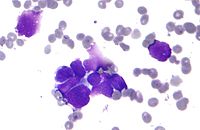
Photo from wikipedia
PURPOSE Treatment-associated upregulation of suppressive checkpoints and a lack of costimulatory signals compromise the antitumor efficacy of oncolytic virus immunotherapy. Therefore, we aimed to identify highly effective therapeutic targets to… Click to show full abstract
PURPOSE Treatment-associated upregulation of suppressive checkpoints and a lack of costimulatory signals compromise the antitumor efficacy of oncolytic virus immunotherapy. Therefore, we aimed to identify highly effective therapeutic targets to provide a proof-of-principle for immune checkpoint together with oncolytic virus-mediated viro-immunotherapy for cancer. METHODS A fusion protein containing both the extracellular domain of programmed death-1 (PD-1) and the poliovirus receptor (PVR) was designed. Next, the corresponding expression fragment was inserted into the genome of a replication-competent adenovirus to generate Ad5sPD1PVR. The infection, expression, replication and oncolysis of Ad5sPD1PVR were investigated in hepatocellular carcinoma (HCC) cell lines. Immune activation and the antitumor efficacy of Ad5sPD1PVR were examined in HCC tumor models including a humanized immunocompetent mouse model. RESULTS Ad5sPD1PVR effectively infected and replicated in HCC cells and secreted sPD1PVR. In a H22 ascitic HCC mouse model, intraperitoneal injection of Ad5sPD1PVR markedly recruited lymphocytes and activated antitumor immune responses. Ad5sPD1PVR exerted a profound antitumor effect on ascitic HCC. Furthermore, we found that Ad5sPD1PVR-H expressing sPD1PVR of human origin exhibited potent antitumor effects in a HCC humanized mouse model. We also found that CD8+ T cells mediated the antitumor effects and long-term tumor-specific immune surveillance induced by Ad5sPD1PVR. Finally, when combined with fludarabine, the antitumor efficacy of Ad5sPD1PVR was found to be further improved in the ascitic HCC model. CONCLUSIONS From our data we conclude that the newly designed recombinant Ad5sPD1PVR virus significantly enhances CD8+ T cell-mediated antitumor efficacy with long-term tumor-specific immune surveillance in hepatocellular carcinoma, and that fludarabine is a promising therapeutic partner for Ad5sPD1PVR.
Journal Title: Cellular oncology
Year Published: 2021
Link to full text (if available)
Share on Social Media: Sign Up to like & get
recommendations!